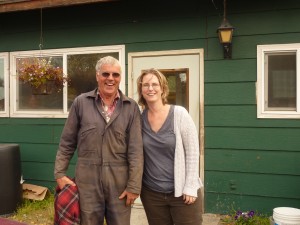Farm to School Program blooms in Alaska
January 14, 2013

Nancy Tarnai
907-474-5042
1/14/13
Two years ago, Alaska’s Farm to School Program was just getting started. In 2012, the program reached over 20,000 students.
How is that possible?
According to FTS Coordinator Johanna Herron, the success is due to collaboration with other agencies and the willingness of school nutrition professionals to incorporate Alaska-grown food into school lunches.
“We became a central place to go to for information,” Herron said. “I have 400 people on my list-serve. We act as a clearinghouse for national information and we build connections between youth and the food system.”
From Sitka to Bethel, Farm to School has touched the lives of students in a variety of ways. A few examples from 2011-2012 include:
In Nenana, a kitchen garden provided over 650 pounds of produce for the school and a workshop on making sauerkraut from cabbage was held.
In Hope, a hot lunch program was developed with student-grown vegetables and edible flowers. The students held a harvest potluck and used indoor garden boxes to grow produce during the winter.
In Bethel, a taste testing of turnips, cabbage and local eggs was held to promote healthy eating. Students made veggie breakfast burritos and used locally harvested potatoes, rutabaga, celery, carrots and onion to make stew.
In Sitka, local fish is served to 700 students in two schools. The Sitka school lunch program serves locally harvested fish twice a week and introduced stream-to-plate curricula, fostering a connection to the local fishing culture.
In Fairbanks, the J.P. Jones Community Development Center established garden plots for children and partnered with the Fairbanks Soil and Water Conservation District to offer agricultural lessons and farmer visits. The summer program culminated with an all-Alaska meal for the children and the local urban community.
In all the myriad of projects and activities Herron has been involved in, some memorable moments stand out. “One of my favorites was when I was on a conference call with two Delta farmers and a Fairbanks school nutritionist and heard it happening,” Herron said. “I thought yes they are buying barley flour and cabbage. All the planning paid off. We were making it happen.”
Another special memory was when she helped conduct a carrot taste test at a school and the children were surprised that carrots can grow in Alaska. “Working with kids is my favorite thing,” Herron said. She gets many thank you letters from school children she has visited. “Having that connection with kids is what it’s about for me.”

Herron expressed surprise at the leadership role Alaska Farm to School has taken. It was used in a national case study for policy and other states have called Herron to get information for their legislators and school garden food safety guidelines she developed.
Stacey Sobell, western regional lead for the National Farm to School Network, said in an e-mail: “While Alaska joined the world of Farm to school in earnest in just the last couple of years, it has done so with tremendous gusto. Under the enthusiastic leadership of Johanna Herron, Alaska is now recognized as a national leader in Farm to School, producing models that have been shared with and emulated by other states across the country.”
Herron said people are always interested to hear that Alaska has Farm to School. “They think if we can do it they can do it,” she said.
The vastness of Alaska is one challenge for the program, as is the variety of the bounty. “We have tried some things from other states that haven’t worked,” Herron said. “We have had to make it our own.”
Working with the state education department’s Childhood Nutrition program, UAF Cooperative Extension Service and Health and Social Services’ Obesity Prevention Program has been integral to the progress Farm to School has made, Herron said. Those partnerships have been essential to all that has been accomplished.
Another vital component is the school district food service professionals. “I’ve never met one who doesn’t want what is best for the kids,” Herron said. They have been so receptive to the program that Herron is on the agenda for their statewide conference in Anchorage later this month. She will bring farmers together with the school nutritionists for a panel discussion. “This will get the right people in the room,” Herron said.
Amazingly, Farm to School has touched all of the state’s school districts in some fashion, with grants awarded to 33 districts. “That’s a lot of engaged people,” Herron said.
She believes strongly that getting local food into schools is only the first step. The other part is educating the children about food, and she credits teachers with helping to do this. “We provide them materials that work and tools for engaged teachers to take advantage of,” Herron said.
Farm to School is a three-pronged program, Herron explained: economy, environment and education. “Those are our three Es.”
Farm to School is a national program run by the U.S.D.A. Department of Agriculture. Here it is coordinated through the state Division of Agriculture, Department of Natural Resources.
Contact information:
Johanna Herron
907-374-3714
Johanna.herron@alaska.gov
www.facebook.com/alaskafarmtoschool
For updates, news, grant opportunities, and announcements join their listserv at: http://list.state.ak.us/soalists/akfarmtoschool/jl.htm
This column is provided as a service by the UAF School of Natural Resources and Agricultural Sciences and the Agricultural and Forestry Experiment Station. Nancy Tarnai is the school and station’s public information officer. She can be reached at ntarnai@alaska.edu


